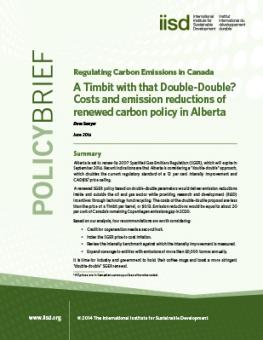
A Timbit with that Double-Double? Costs and emission reductions of renewed carbon policy in Alberta
This report has a sharable inforgraphic, click here to view.
Alberta is set to renew its 2007 Specified Gas Emitter Regulation (SGER), which will expire in September 2014. Recent indications are that Alberta is considering a “double-double” approach, which doubles the current regulatory standard of a 12 per cent intensity improvement and CAD$15 price ceiling. This report examines the implications of a renewed SGER with both a 24 per cent greenhouse gas intensity improvement that sets the greenhouse gas reductions required from the oil and gas sector and a $30 per tonne price ceiling that sets a maximum cost obligation to comply with the regulations.
A renewed SGER policy based on double-double parameters would deliver emission reductions inside and outside the oil and gas sector while providing research and development incentives through technology fund recycling. The costs of the double-double proposal are less than the price of a Timbit per barrel, or $0.13; however, emission reductions would be equal about 20 per cent of Canada’s remaining Copenhagen emissions gap in 2020.
You might also be interested in
Powering the Clean Energy Transition: Net-Zero electricity in Canada
This brief explains how a shift to clean power generation can offer affordable, reliable electricity, benefiting households and businesses alike.
IISD Welcomes Draft Regulations for Oil and Gas Pollution Cap
A firm cap on emissions can provide certainty for industry to invest in decarbonization, while ensuring the sector is on a path to net-zero by 2050.
For Nature-Based Solutions to Be Effective, We Need to Work with Indigenous Peoples and Local Communities
Nature-based solutions have been praised as a promising approach to tackling the twin crises of climate change and biodiversity loss. But some Indigenous Peoples and local communities are questioning the legitimacy of the concept and what it symbolizes. It is time to listen to what they have to say.
How Fossil Fuels Drive Inflation and Make Life Less Affordable for Canadians
New report takes closer look at how Canada’s dependence on fossil fuels impacts energy costs and prices of essentials such as transportation, home heating, and housing.